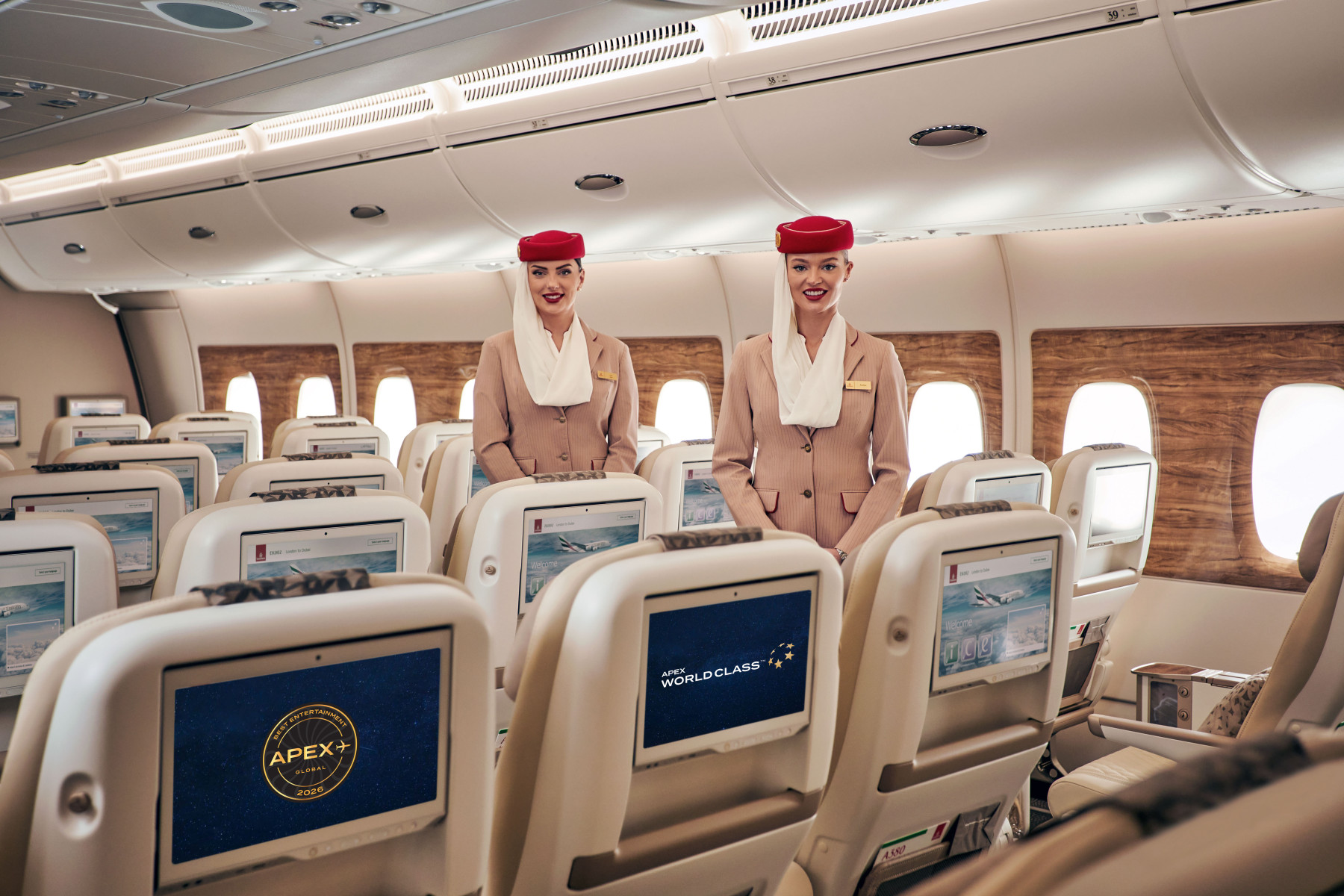Emirates has once again strengthened its status as a global aviation leader after winning two prestigious accolades at the 2026 Airline Passenger Experience Association (APEX) Global Passenger Choice Awards. The Dubai-based carrier was honored with the titles of World Class Airline 2026 and Best Global Entertainment, reflecting its continuous efforts to deliver exceptional customer service, cutting-edge products, and innovative passenger experiences across its network.
The results were announced during the APEX/IFSA Global EXPO held in Long Beach, California, one of the airline industry’s most anticipated annual gatherings.

The World Class Airline recognition is considered one of the highest distinctions in commercial aviation, reserved for airlines that excel in areas such as passenger safety, sustainability, health and well-being measures, service consistency, and global operations. The award is based on a comprehensive evaluation conducted by industry experts in collaboration with Yates and Partners, as well as verified passenger feedback collected through professional auditing of traveler reviews. This recognition places Emirates among the top global carriers that set benchmarks for excellence in airline standards.
In addition, Emirates’ victory in the category of Best Global Entertainment further underscores its long dominance in inflight entertainment. The airline’s award-winning ice system, regarded as one of the most advanced in the world, offers more than 6,500 channels of movies, TV shows, documentaries, music, podcasts, games, and even live sports broadcasts.

Available in multiple languages and updated regularly, the entertainment system has become a defining feature of the Emirates travel experience and a major differentiator for the brand. Passengers also benefit from high-speed Wi-Fi connectivity onboard, allowing them to stay connected throughout their journey, a feature increasingly demanded by today’s travelers.
The APEX Global Passenger Choice Awards are especially noteworthy in the aviation industry as they are based on real passenger experiences and independently audited evaluations rather than solely subjective jury decisions. Millions of travelers worldwide share ratings on nearly 600 airlines each year through TripIt®, feeding into the data that determines winners.
This combination of passenger feedback and independent verification ensures that the accolades reflect genuinely outstanding performance and consistency in airline operations.
For Emirates, these awards come at a time when the airline is actively expanding and modernizing its fleet while also upgrading its services in line with evolving customer expectations. Over the past year, Emirates has introduced retrofitted aircraft with refreshed cabins, including its latest Premium Economy class, offering a new level of comfort.
The airline has also expanded its culinary offerings, elevated beverage services across cabins, redesigned lounges, and strengthened its renowned multicultural crew training programs to deliver more personalized care on board.
Sir Tim Clark, President of Emirates Airline, welcomed the honors, describing them as a testament to the carrier’s unwavering focus on delivering an unmatched customer journey from ground to sky. He highlighted the airline’s commitment not only to luxury and service innovation but also to sustainable aviation, noting Emirates’ steps toward investing in modern, fuel-efficient aircraft, testing alternative fuels, and integrating environmentally conscious features in its products and ground operations.

The recognition also positions Emirates strongly against its global competitors, such as Qatar Airways, Singapore Airlines, and Cathay Pacific, all of which are known for high service standards and premium offerings. By maintaining excellence in both overall travel experience and in-flight entertainment, Emirates consolidates its place as a benchmark airline for premium international travelers seeking comfort, reliability, and consistency.
Looking ahead, Emirates will continue to enhance its global connectivity as it expands into new destinations throughout 2026, with routes planned in markets across Asia, Africa, and the Americas. The airline is also preparing to welcome next-generation aircraft such as the Airbus A350 and Boeing 777-9, both of which will introduce new levels of efficiency and customer experience to its long-haul journeys. These developments are expected to further strengthen Emirates’ position as a leader in passenger satisfaction and an airline that continuously invests in the future of travel.


.jpg)
.jpg)

.jpg)

.jpg)


.jpg)
.jpg)
.jpg)
.jpg)


.jpg)




.jpg)

.jpg)


.jpg)
.jpg)

.jpg)


.jpg)
 (1).jpg)

.jpg)






.jpg)
.jpg)
.jpg)
 (1).jpg)




.jpg)



.jpg)

.jpg)
.jpg)
